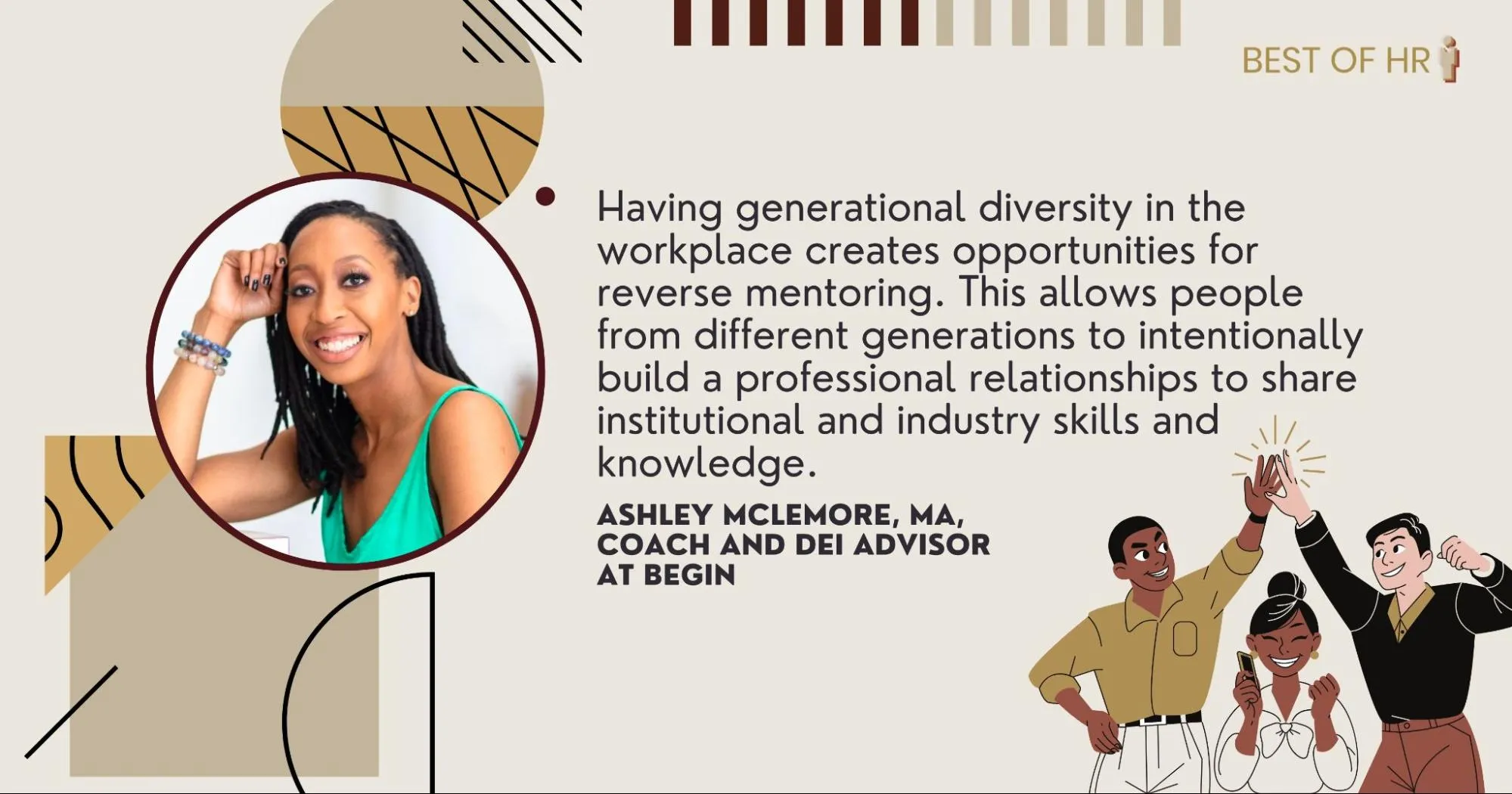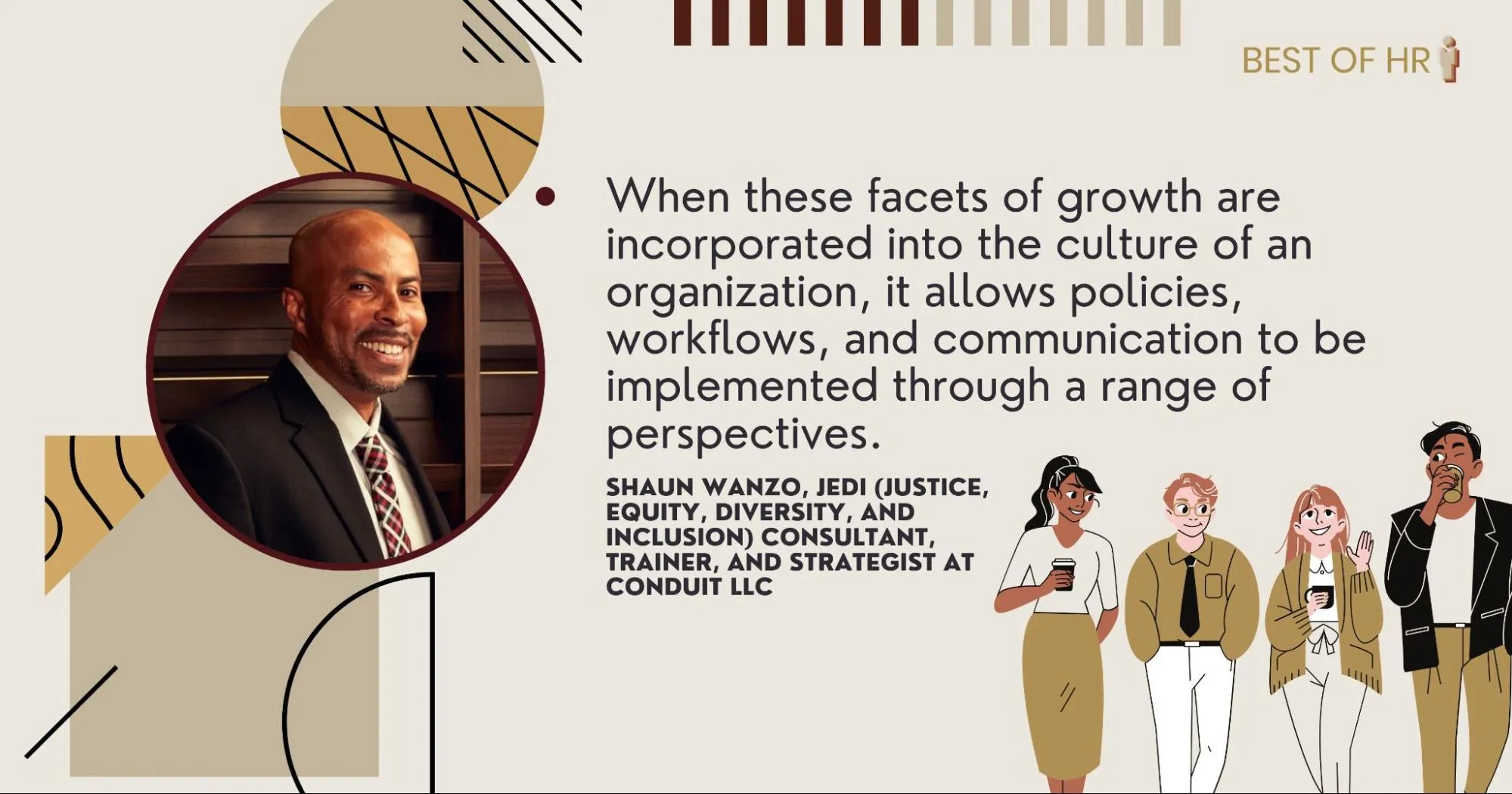What are the benefits of generational diversity in the workplace?
From eliminating a binary decision-making process to disrupting unconscious bias, here are 10 answers to the question, “What are the benefits of generational diversity in the workplace?”
- Eliminates a Binary Decision-Making Process
- Leads to an Abundance of Strategic Innovation
- A Symbiosis Relationship is Key to Growth for Both Generations
- Creates Opportunities for Reverse Mentoring
- Builds a Resilient Organization
- Offers an Opportunity to Practice Self-Awareness and Empathy
- Attracts Top Talent
- Creates Synergy in Conversation
- Creates a Better Product or Service
- Disrupts Unconscious Biases
Eliminates a Binary Decision-Making Process
The presence of generational diversity in the workplace is a key factor in creativity, productivity, and innovation. The different life experiences of a multigenerational workforce allow employees to eliminate a binary decision-making process, facilitating the sharing of varied beliefs, ideas, and points of view. Collaboration in this type of environment brings unique solutions, oftentimes allowing for multiple viable options from which to choose.
A recent workplace experience precisely illustrates this benefit. I was working on part of a project and had a question for my colleague about how to proceed. I presented this younger colleague with two different options, to which they responded with neither. They suggested another idea about which I hadn’t thought, and it was the perfect solution. Multigenerational workforces not only bring with them varied ideas, but a diversity of thought that is not always present in a homogenous group of employees.
Nathan Bird, Senior Program Manager for Diversity, Equity, and Inclusion, Kentucky Chamber of Commerce Foundation
Leads to an Abundance of Strategic Innovation
The one benefit of generational diversity in the workplace is the abundance of strategic innovation.
The knowledge from analog generations is usable data that informs decisions in the digital age to ensure we achieve a sustainable future. Younger generations are quicker to challenge the status quo, examine processes, and advocate for psychological safety. Older generations are structured, consistent, and committed.
As new products and services are introduced, emotional intelligence, critical thinking, and cultural competence are vital attributes across generations that, according to The World Economic Forum, are projected to increase the GDP by 20% in the next three years.
Zoe Moore, Strategic EDI Consultant, Grow with Zomo
A Symbiosis Relationship is Key to Growth for Both Generations
Inclusion and belonging principles can become harder to see and apply when the context isn’t related to dimensions of diversity that get more attention. The reality is that institutional and tribal knowledge flies out the door when older and younger co-workers miss the unique contributions of the other. DEI and OD/OE practitioners have to help the organization realize the symbiotic relationships between generations or lose to their competitors who get it.
Randy Wilson, Director, Diversity, Equity and Inclusion, Flatiron Construction
Creates Opportunities for Reverse Mentoring
Having generational diversity in the workplace creates opportunities for reverse mentoring. This allows people from different generations to intentionally build a professional relationships to share institutional and industry skills and knowledge.
These reverse mentoring sessions specifically position the more junior person as the mentor and the more senior person as the mentee. This is important to shift the perspective of who can be the teacher and who can learn in the workplace. You can coordinate these across teams or departments; you don’t want to pair people with their supervisor, and if at all possible, conduct a brief anonymous poll to gauge interest in participating in a reverse mentoring program.
Ashley McLemore, MA, Coach and DEI Advisor, BEGIN

Builds a Resilient Organization
As we pivot into 2023, the emphasis on people, culture, emotional intelligence, talent, and mental health has risen on the list of C-suite concerns. With these types of salient concerns, organizations need to be resilient.
One of the many benefits of generational diversity in the workplace is that it builds a resilient organization. The kaleidoscope of how people survived the past three years, the uniqueness of how they view the world, life, their diversity in education, work, and leadership experiences entering one culture makes an organization unstoppable. It is the ultimate masterclass in change management.
Kimberly S. Reed, Diversity, Equality, Inclusion and Belonging Executive and Advisor, Reed Development Group
Offers an Opportunity to Practice Self-Awareness and Empathy
There are currently five generations in the workplace, and while age is constantly changing over our lifetime, our generational identity stays with us.
Generational diversity offers an opportunity for everyone to practice self-awareness and empathy for those who are different from them. Generational identity might make us feel more included, or alternatively, we could experience generational exclusion, as ageism has the potential to negatively impact any generation.
When teams are generationally diverse, there is an increased opportunity to mitigate generational bias and create psychological safety through the practice of self-awareness and empathy.
By learning to observe and embrace generational diversity, teams increase their potential to become more inclusive overall, since most people know the feeling of being the “youngest” person on a team, at an event, or similar at one time in their life.
Overall, teams with high empathy and psychological safety typically outperform those without.
Wendy Dlakic, MEd, Senior Manager DEI Training, City of Hope
Attracts Top Talent
Generational diversity helps to attract the right talent from a bigger pool of candidates. The competition for the best talent is global. By embracing and appreciating years of experience and fresh ideas equally, organizations can also navigate different customer needs more successfully.
Halla Hänninen, Sales and DEI Expert, Mazhr
Creates Synergy in Conversation
We find that there is a measurable focus on uniqueness and specificity in differences between multiple generations interacting with each other in person, virtual, and hybrid work environments. The conversations tend to be on the differences, yet the major considerations which impact all employees, irrespective of which age group they identify with, include creating psychologically safe spaces for dialogue and collaboration.
If an organization can create a psychologically and emotionally safe environment for its employees, it can respond to the unique needs of each employee, whether they identify or are identified as being a Boomer, Gen-Xer, Millennial, or Gen Z.
Saleha Khan, Sr. Inclusion Lead, Toronto Police Service
Creates a Better Product or Service
The benefits of generational diversity in the workplace are that it can help cultivate innovation, experience, and exuberance. When these facets of growth are incorporated into the culture of an organization, it allows policies, workflows, and communication to be implemented through a range of perspectives.
Ultimately, a complimentary relationship between senior leadership and younger employees can be formed, allowing for more effective outreach to the target demographic. The end result is a more connected culture and a better product and service, which should be the goals of every organization.
Shaun Wanzo, JEDI (Justice, Equity, Diversity, and Inclusion) Consultant, Trainer, and Strategist, Conduit LLC

Disrupt Unconscious Biases
A workforce that encompasses multiple generations is crucial for a variety of reasons. Among its advantages is the potential to disrupt unconscious biases, which arise when our brains automatically fill in missing information with assumptions. Such biases can affect not only individual interactions, but also project outcomes. Generational diversity contributes to more dynamic and innovative conversations while emphasizing that relying on stereotypes and assumptions is rarely the most effective approach to problem-solving.
Jessica Rowe, Co-founder, RecruitAERO Corporation
Submit Your Answer
Would you like to submit an alternate answer to the question, “What is one benefit of generational diversity in the workplace?”
Related Questions
- How do you increase generational diversity in the workplace?
- What are the best practices for managing millennials in the workplace?
- What are communication best practices with multiple generations in the workplace?

